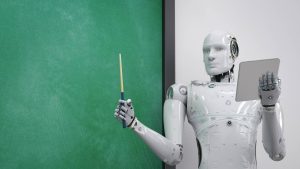Impact of technology is a key factor in changing the way learners acquire information and the way teachers share the knowledge.
The most prominent aspect of this new era in education are Artificial Intelligence (AI), pioneering a revolutionary approach that allows the development of custom learning environments adjusted to the individual requirements and capabilities of every pupil.
AI tutors have emerged as powerful devices that make use of machine learning as well as data analysis.
They provide students not just with custom-designed lessons as well as instant feedback that allows to mastery using personalised pathways.
This article systematically explores the enormous potential of AI tutors. It also considers the immense impact they may be able to have on the future of learning.
Power of Personalization

The Role of AI in Personalized Learning
AI tutors are designed to provide students with a personalized learning experience. By analyzing data on each student’s progress, strengths, and areas that need improvement, these AI-driven systems can adapt and customize lessons to suit the individual’s needs.
Whether a student is struggling with a specific concept or advancing quickly through the material, AI tutors ensure that the learning process aligns with their unique pace and requirements.
Customized Learning Paths
One important thing about AI tutors is they can make personalized learning paths.
Usually, regular classrooms use the same approach for everyone, which can leave some students feeling uninterested or struggling to keep up.
AI tutors, however, can change the difficulty and content of lessons based on how a student is doing.
This ensures that the material remains engaging and challenging, keeping learners motivated to progress.
Benefits of AI Tutors

1. Immediate Feedback
AI tutors offer instant feedback, a crucial component of effective learning. Whether a student has answered a question correctly or made a mistake, the AI system provides feedback in real time. This immediate response helps students grasp concepts more effectively and correct any misconceptions promptly.
2. Accessibility
AI tutors are accessible 24/7, eliminating the constraints of time and location. Students can learn at their convenience, whether it’s late at night, during a lunch break, or on the weekends. This accessibility makes education more inclusive and flexible, accommodating the diverse schedules and commitments of learners.
3. Continuous Assessment
AI tutors continuously assess a student’s progress. Through quizzes, assignments, and interactive activities, these systems track performance and provide detailed reports on areas that need improvement. This data-driven approach allows educators and students to identify strengths and weaknesses, enabling targeted learning strategies.
AI Tutors in Practice

Duolingo: Personalized Language Learning
Duolingo, a widely recognized language learning app, utilizes AI to offer personalized language lessons. The app covers a multitude of languages, making it a valuable tool for learners worldwide. Duolingo’s AI assesses a learner’s proficiency and adapts lessons accordingly, focusing on areas that need improvement. The app also offers speaking and listening exercises, enhancing overall language skills.
Promova: Tailored Language Learning Journeys
Promova, another noteworthy language learning app, stands out for its personalized approach. The app creates tailored language learning journeys for individuals, whether they are beginners or seeking to enhance their language skills further. Promova’s AI-driven platform includes conversational practice with native speakers, vocabulary and grammar exercises, and cultural insights, making language learning engaging and effective.
Quizlet: Adaptive Study Aids
Quizlet is a versatile study tool that employs AI to enhance the learning process. It allows users to create flashcards and study sets on various subjects. Quizlet’s AI suggests personalized study aids based on a user’s progress and the difficulty of the material. This adaptability ensures that students focus on the areas where they need the most help.
Khan Academy
Khan Academy leverages AI to provide free, world-class education to anyone, anywhere. Through practice exercises, instructional videos, and a personalized learning dashboard, students can study at their own pace and receive targeted support.
EdX
EdX is another prominent platform that utilizes AI to enhance the learning experience. It offers thousands of courses across various subjects and disciplines. AI-driven tools like virtual proctoring and personalized recommendations help students succeed in their academic pursuits.
Challenges and Considerations
While AI tutors offer numerous benefits, there are challenges and considerations to be mindful of:
1. Data Privacy
AI tutors rely on data to personalize learning experiences. Ensuring the privacy and security of this data is paramount. Educational institutions and app developers must implement robust data protection measures to safeguard sensitive information.
2. Technology Access
Not all students have equal access to technology. Addressing the digital divide and ensuring that AI-driven education remains accessible to all socioeconomic groups is crucial.
The Future of AI Tutors

As AI technology continues to advance, the future of AI tutors holds great promise. Here are some emerging trends that will likely shape the landscape of AI-powered education:
Emphasis on Soft Skills
While AI tutors excel at delivering subject-specific content, there is a growing recognition of the importance of soft skills such as creativity, critical thinking, and emotional intelligence. Future AI tutors may incorporate modules that develop these essential skills. You can also have easy access to learning English online with native speakers using your laptop or smartphone.
Greater Integration with Classroom Learning
AI tutors are expected to become more integrated into traditional classroom settings. Educators can use AI-powered tools to assist in classroom management, assessment, and personalized support for students.
Enhanced Customization
AI tutors will become even more adept at tailoring learning experiences to the individual. They may offer content in various formats, such as text, video, and virtual reality, to accommodate different learning styles.
Ethical Considerations
As AI plays a larger role in education, ethical considerations, such as data privacy and algorithmic bias, will come to the forefront. Ensuring that AI tutors are fair, unbiased, and transparent will be crucial.
Closing Thoughts
AI tutors represent a transformative force in education, offering personalized, flexible, and data-driven learning experiences. Whether it’s language learning apps like Duolingo and Promova or versatile study aids like Quizlet, AI-driven systems are shaping the way students acquire knowledge and skills. As technology continues to advance, the potential for AI tutors to revolutionize education and make learning more engaging and effective is boundless. Embracing AI tutors in education heralds a future where every student can receive the personalized support they need to succeed.
Incorporating AI tutors into educational strategies can yield substantial benefits. These AI-driven systems adapt to each student’s unique pace and needs, offering customized learning paths and immediate feedback. Prominent language learning apps like Duolingo and Promova employ AI to provide tailored language lessons, while versatile study aids like Quizlet enhance the learning process.
However, there are challenges to consider, such as data privacy and technology access. Despite these challenges, the potential for AI tutors to revolutionize education and make learning more engaging and effective is boundless. Embracing AI tutors in education heralds a future where every student can receive the personalized support they need to succeed.




